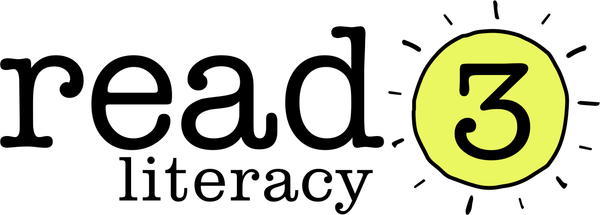Research supporting Read3 best-practice
Read3 was developed in response to 20 years of clinical experience working with children with severe literacy challenges. Strategies incorporated in the program draw from the best evidence-based research available internationally.
Berninger, V. W., & Wolf, B. (2009). Helping Students with Dyslexia and Dysgraphia Make Connections: Brookes
Compton, D. L., Miller, A. C., Elleman, A. M., & Steacy, L. M. (2014). Have we forsaken reading theory in the name of “quick fix” interventions for children with reading disability? Scientific Studies of Reading, 18(1), 55-73
Dehaene, S. (2021) How We Learn: The New Science of Education and the Brain. Penguin; 1st edition, 4 May 2021.
Dehaene, S. (2019) Reading in the Brain: The New Science of How We Read. Penguin; 1st edition, 22 January 2019.
Donnelly, P.M., Huber, E., & Yeatman, J.D. (2019) Intensive Summer Intervention Drives Linear Growth of Reading Skill in Struggling Readers. Frontiers of Psychology, August 2019; 10, 190. https://www.frontiersin.org/articles/10.3389/fpsyg.2019.01900/full
Ehri, Linnea C. (2014) Orthographic Mapping in the Acquisition of Sight Word Reading, Spelling Memory, and Vocabulary Learning, Scientific Studies of Reading
Fletcher, J.M., Reid Lyon, G., Fuchs, L. & Barnes, M.A. (2019) Learning Disabilities (2nd Edition) Chapter 10: The Problem of Automaticity, Guilford Press
Graham, F., Rodger, S & Ziviani, J. (2009) Coaching parents to enable children’s participation: an approach for working with parents and their children. Australian Occupational Therapy Journal.
Kilpatrick, David (2016). Equipped for Reading Success. Casey & Kirsch
Kilpatrick, David (2019): Understanding the Role of Phonemic Proficiency in Boosting Reading Skills in Struggling Readers, Arkansas Literacy Association Presentation
Landerl, K., Freudenthaler, H., Heene, M., De Jong, P., Desrochers, A., Manolitsis, G., Parrila, R., & Georgiou, G. (2019) Phonological Awareness and Rapid Automatized Naming as Longitudinal Predictors of Reading in Five Alphabetic Orthographies with Varying Degrees of Consistency, Scientific Studies of Reading, 23:3, 220-234
Lee, S., Cui, Y., & Tong, S. X. (2022). Toward a Model of Statistical Learning and Reading: Evidence From a Meta-Analysis. Review of Educational Research. 92.
Leppanen, U., Aunola, K., Niemi, P. & Nurmi, J., (2008) Letter Knowledge Predicts Grade 4 Reading Fluency and Reading Comprehension, Learning and Instruction v18
Lovett, M. W., Frijters, J. C., Wolf, M., Steinbach, K. A., Sevcik, R. A., & Morris, R. D. (2017).
Early intervention for children at risk for reading disabilities: The impact of grade at intervention and individual differences on intervention outcomes. Journal of educational psychology, 109(7), 889–914
McWillian, R.A. (2016). Routines-Based Early Intervention: Supporting Young Children and Their Families
Ozernov-Palchik O, Norton ES, Sideridis G, Beach SD, Wolf M, Gabrieli JDE and Gaab N.(2017) Longitudinal stability of pre-reading skill profiles of kindergarten children: implications for early screening and theories of reading Developmental Science 2017 Sep: 20(5).
Pollatsek, A. and Treiman, R. (eds) (2015) Oxford Handbook of Reading. New York: Oxford University Press.
Roberts, T., and Sadler, D. (2018) Letter sound characters and imaginary narratives: Can they enhance motivation and letter sound learning, Early Childhood Research Quarterly: Volume 42. Pages 97-111.
Sargiani, R., Ehri, L.C., Maluf, M.R. (2021) Teaching Beginners to Decode Consonant– Vowel Syllables Using Grapheme– Phoneme Subunits Facilitates Reading and Spelling as Compared With Teaching Whole- Syllable Decoding. Reading Research Quarterly, International Literacy Association.
Seymour, P & Duncan, L. (1997) Small versus Large Unit Theories of Reading Acquisition. Dyslexia, 3(3):125 - 134
Shanahan, T. (2021) A Question I Hate: Should We Use Pictures (Embedded Mnemonics) When Teaching Phonics.
Share, D. (1995) Phonological recoding and self-teaching: sine qua non of reading acquisition. Cognition, Volume 55, Issue 2, May 1995, Pages 151-218
Tilanus, E., Segers, E & Verhoeven, L., (2019) Predicting responsiveness to a sustained reading and spelling intervention in children with dyslexia. In Dyslexia, Wiley & Sons.
Van Otterloo, S.G.,. Van der Leij, A. and Henrichs, L.F. (2019) Early Home-Based Intervention in the Netherlands for Children at Familial Risk of Dyslexia. Dyslexia 15(3):187-217
Vaughn, S. & Fletcher, J. (2021). Identifying and teaching students with significant reading problems. American Educator, Winter 2020-2021, 4 - 11, 40
Vousden, J.I., Ellefson, M.R., Solity, J., & Chater, N. (2010) Simplifying Reading: Applying the Simplicity Principle to Reading. Cognitive Science 35 (2011) 34–78
Vazeux, M., Doignon-Camus, N., Bosse, M., Mahe, G., Guo, T. & Zagar, D. Syllable-first rather than letter-first to improve phonemic awareness. Scientific Reports (2020)
Willcutt, E., McGrath, L., Pennington, B., Keenan, J., DeFries, J., Olson, R & Wadsworth, S. (2019) Understanding comorbidity between specific learning disabilities. New Directions in Child & Adolescent Development.
Wolf, M., & Stoodley, C. J. (2008). Proust and the squid: The story and science of the reading brain. New York: Harper Perennial.
